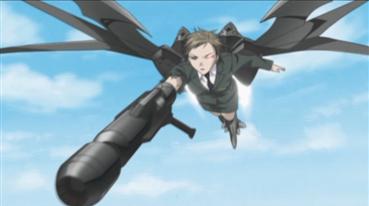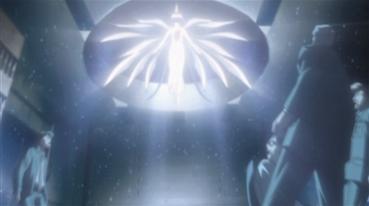|
Note: I would reccommend that you read my review of She, The Ultimate Weapon Volume 1 at least, in order to get a basic idea of the story and the concepts of this series.
Supplementing the previously-released She, The Ultimate Weapon (or Saikano as it's known in Japan) is a two-episode OVA intended as a companion to the series. Entitled Another Love Song, it takes place during the first eight episodes of the main series, and shows the side of the story that we didn't see – the military side. The OVA goes into some detail about how Chise, the titular Ultimate Weapon, was produced, seen through the eyes of her predecessor – Lt. Colonel Mizuki.

Something that worried me when I first heard of this "epilogue" to the She series was that it wouldn't be accessible to people who hadn't seen the main series, just as the Tenchi movies was. My fears were ultimately unfounded; not only does the OVA take place during (and not after) the series, it covers entirely different ground. While She is mostly about Chise's love for Shuji, Another Love Song concentrates on what Chise did when we didn't see her – using the character of Mizuki, and her unrequieted love for Tetsu, as a focusing point. It also explains enough about the background to allow viewers who've never seen the series to jump in and enjoy it as a self-contained story all to itself.
In Mission 1, the cyborg weapon Lt. Colonel Mizuki first meets her "replacement", a young girl named Chise. Mizuki isn't bothered about Chise's young age – only that she be willing to fight for her country when needed. And so far, Chise hasn't shown any will to fight, refusing to accept her status as a weapon. Mizuki grows increasingly frustrated with her lack of fighting spirit, and in a harsh conversation, tells Chise to stop crying over her circumstances and use her powers to save the lives of the soldiers on the battlefield. Her message is that what's done is done, and that she should simply learn to make the best of her new abilities.
However, in Mission 2, Mizuki learns – through a psychic link – that Chise has fallen in love with Shuji, and that she is becoming psychologically unstable over the amount of destruction she is forced to perform. Thinking back to her stilted relationship with Liutenant Tetsu, wom she was forced to abandon after becoming a weapon, she goes to Chise and advocates leaving her military career behind, and running away to be with Shuji. Although she doesn't say as much, it's clear that Mizuki is doing this to try to preserve Chise's humanity – rather than labelling her as a mere weapon.
In the end, Another Love Song offers valuable insights both into Chise's character, and to the scientists who helped to create her. This is something that I said I wanted to see in my review of Volume 2 – the real reason behind Chise's recruitment. In a telling scene, Mizuki demands to know why Chise was chosen, instead of a fully-mature adult. The scientists hem and haw and make excuses like "She was the only one compatible" and "We had no choice" – to Mizuki (and to me), it doesn't wash. If I was forced into such a situation, I would not choose to turn a fifteen-year-old girl into a living weapon; it's monstrous and contemptible. The humane thing to do would be to abandon the project rather than use these methods to gain advantage over an enemy. But then, wars are almost never humane – and that's the point of the whole thing, really.

Art is in the same style as the main series, though the shifted focus to combat scenes and military operations shows off the artists' talent for creating a believable war far more than the limited, minute-long clips of combat did in the main series. Sound, again, shifts more towards fast-paced battle themes and guitar pieces than the subdued (and often nonexsitant) incidental music of the series. The voice acting isn't spectacular, but gets the job done well enough.
If you were moved by the tragic love story of the original series, and want to see more of Chise's emotional struggles that were "behind the scenes" during the episodes, you'll definitely be interested in Another Love Song. While it's not the imagined "epilogue" to the series, those who crave the "full story" will want to have this. It complements the series very well, and at times, almost feels like it's two episodes that couldn't be squeezed into the series. And, surprisingly, it holds up well on its own merits, with great combat action scenes and "another love song" all of its own.
In keeping with earlier volumes of the series, both sound and vision fall into the category of "quite good, but could be better." The picture is once again framed 16:9 but once again not anamorphically enhanced, resulting in a degraded picture when zoomed in. This is a shame, as the print is otherwise in good shape.
Both the Japanese and English 5.1 tracks are clear and lively enough, but again are somewhat non-specific in their use of the surrounds. Unlike this disc's series predecessors, there is no second disc DTS track, but few will miss it.
Extra features on this disc aren't anything to write home about – there's some production artwork, the Japanese promo and trailers for Naruto, Ghost in the Shell 2 and Ghost in the Shell: Stand Alone Complex.
|